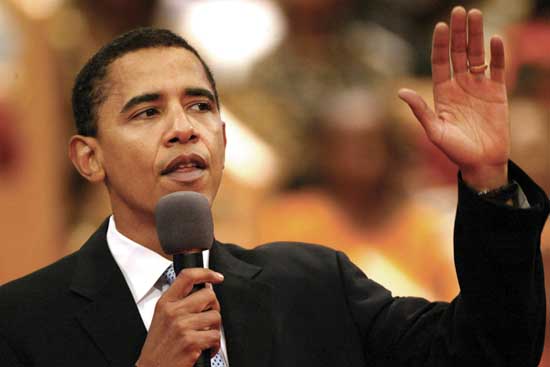Obama expresses optimism at disarmament deal with Russia
 London - US President Barack Obama spoke Wednesday of the rift between the US and Russia, but expressed hope that a new US- Russian nuclear arms reduction deal could open the way to a new dialogue between the two countries, after a period of tension.
London - US President Barack Obama spoke Wednesday of the rift between the US and Russia, but expressed hope that a new US- Russian nuclear arms reduction deal could open the way to a new dialogue between the two countries, after a period of tension.
A key issue for both nations is the scaling back of nuclear proliferation, in light of a US-Russian strategic weapons reduction programme (START) due to expire at the end of 2009.
Under the START programme in place since 1994, both countries have pledged to a strategic arsenal of no more than 6000 warheads and 1600 carrier missiles.
"There are real differences between the US and Russia, and I have no interest in papering those over," Obama said, ahead of a meeting in London with Russian President Dmitri Medvedev on the sidelines of the G20 Summit.
Obama has defined nuclear disarmament as one of the key objectives for his presidency, while Russia has suggested that heavy bombers and intercontinental missiles could be incorporated into a follow-on agreement to START.
The US president acknowledged that there had been "years of drift" in relations between Washington and Moscow, at a joint press conference with British Prime Minister Gordon Brown.
Obama went on to say there was also a lot of common ground between the two former Cold War superpowers, including fighting terrorism and boosting economic growth. But, he added, nuclear reduction was a "good place to start" in forging closer relations.
The Russian and the US leaders are meeting in London for the first time since Obama's inauguration, ahead of Thursday's Group of 20 (G20) summit of leading world economies.
The US and Russia are both keen to rebuild relations that soured towards the end of the previous US administration under George W Bush, plummeting to a low point during Russia's military intervention in Georgia last year.
There is also a series of challenges for the two leaders, who have exchanged letters since Obama's inauguration in an attempt to find a new framework for cooperation.
Russia brings concerns to Wednesday's meeting over US plans for a missile defence system in Poland and the Czech Republic, initiated by former president George W. Bush.
While Obama has not officially overturned the programme, he has shown willingness to renegotiate with Moscow, which sees it as a clear threat to Russian regional interests.
A burning issue for the Obama administration is to prevent Iran from acquiring nuclear weapons. Russia plays a key role here, as the main supplier of technology and nuclear material which, Iran says, is purely for civil purposes.
Both leaders have expressed a desire for rapprochement ahead of Wednesday's meeting, whilst making it clear that this would not come at any cost.
White House spokesman Robert Gibbs said, Obama "desires a productive relationship with the Russians, that we can work together on issues of mutual interest."
"Nobody believes that a change in our relationship means giving anybody all that they want," Gibbs said, during a mid-air press briefing en route to London on Tuesday.
"That's certainly not the intention of the President," Gibbs added.
Other issues straining the relationship include US support for NATO to expand eastwards, notably the question of eventual membership for Ukraine and Georgia.
Ahead of the meeting, Medvedev also repeated China's call to reevaluate the dollar as reserve currency.
""We should also think together of whether it might be expedient to introduce a world supranational reserve currency, potentially under the aegis of the International Monetary Fund," Medvedev told the Washington Post.
Other issues include Russia's fuel supply to Europe, highlighted during an energy row with Ukraine that threatened provisions earlier this year.
On the subject of civil rights in Russia, Obama has shown himself to be more pragmatic than his predecessor, displaying a willingness to look beyond human rights issues to negotiate over topics including terrorism and nuclear proliferation. (dpa)